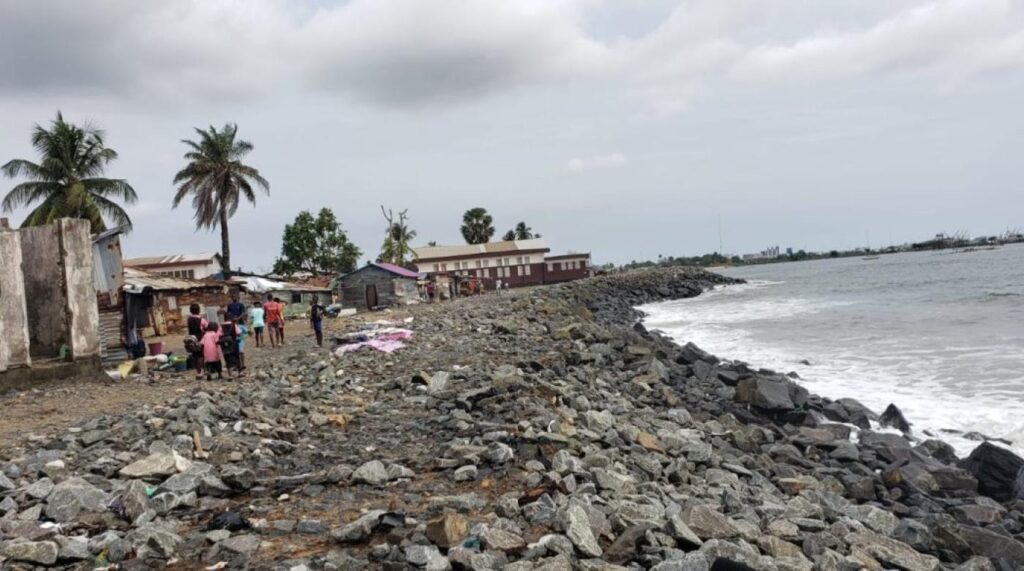
… Assistant Mines, Energy Minister Wollabo claims
When President George Weah launched the second phase of the UNDP-supported Coastal Defense Project in the borough of Nthoudihew Kru Town in 2018, it appears as houghg the specifications of the initiative were not adequately communicated to the beneficiaries, if recent development is anything to go by.
While the project implementer and their engineers were doing another thing, the residents were expecting a finished product that is totally different from what has been designed—considering what the locals and the government are saying.
Financed by the Global Environment Facility’s Least Developed Countries Fund, the US$4 million project’s two major outcomes are to ensure that the vulnerability of physical assets is reduced, and that affordable measures to protect New Kru Town, and Hotel Africa, against climate change impacts are demonstrated.
But since the launch, this dream is yet to become a reality for residents of the Borough as their hopes have dissipated into a nightmare. Some say they are even more vulnerable now than before the arrival of the project.
The residents are disappointed. They told the Daily Observer that the coastal defense initiative has become illusive, as sea erosion continues to damage their homes. The residents did not know what the project was in the first place.
While they were anticipating a concrete wall that would have protected their community from the constantly invading, the government said it had told them that it was constructing a sea wall made of rocks.
The residents, who expressed their disappointment in the strongest terms, told the Daily Observer that the coastal defense initiative has become illusive, as sea erosion continues to damage their homes.
“We were promised by the government, but nothing has been done,” said Bordeo Liberson, an elder from the Borough. “When George Weah came to power, his government promised to build concrete walls that will stop the ocean from washing away our homes. Nothing has happened and our homes are being overwhelmed by sea erosion.”
In reaction to the residents’ concerns, the government has said that it did not promise the people of New Kru Town a concrete wall as the defense against the rampaging sea.
Assistant Mines & Energy Minister, Johnson Wollabo, said the residents of the borough misinterpreted the intent of the project.
“Nobody told them we were going to build concrete walls,” Wollabo told the Daily Observer in an interview on Thursday.
When the President launched the project in 2018, the Assistant Minister said it was intended to be a sea wall made of rocks, not concrete walls as the resident had anticipated, the minister said.
“In coastal engineering, you don’t build concrete walls in that place, in fact when you try to do it will be too expensive, ” he said.
New Kru town is an informal settlement located on the west coast of Liberia with over five hundred inhabitants. Monrovia’s rapid growth since the end of the war in 2003 means slum-dwellers make up 70% of the city’s population, according to the Cities Alliance report
Many of them do not have regular or well-paid jobs. They are poor and barely struggling to survive.
With the constant sea rising, residents had thought that the UNDP funded project would have brought them some, but little they knew it were rocks wasted at the edge of the sea to stop the water from breaking their homes—this has not been successful, the resident said.
“No house has been destroyed since we put the structure. What has been happening is that when there is a huge storm the wave will come and over tap the reversement(rocks), Wollaba adds.
New Kru town is one of Monrovia’s densely populated environments with limited housing and squalid living conditions, most zinc zacks. Many people are squeezed into small rooms built without any urban planning or adherence to zoning regulations.
Moreover, they lack basic services like toilets, dumping sites, and water and have little access to sanitation, causing them to defecate on the beaches.
According to Wollaba, after the rocks installation residents were warned not to build houses closer to the reversement, and dump them in the sea.
“We told them don’t bring your house to where the reversement covers.”
He said what the inhabitants are experiencing is called over tapping of the waters when there is a storm surge the water will flash on their house but it will not destroy their house.”
“They take all their plastic bags and other things and dump them in the water. So recently when the storm surge occurred the water over tap the reversement it will not destroy anything but the water will always spread within that vicinity where we say nobody should build and it takes less than one hour to go into the ground so where is the promise that somebody promised to get sea walls built?
Read the Original Article in the Liberian Observer Newspaper















